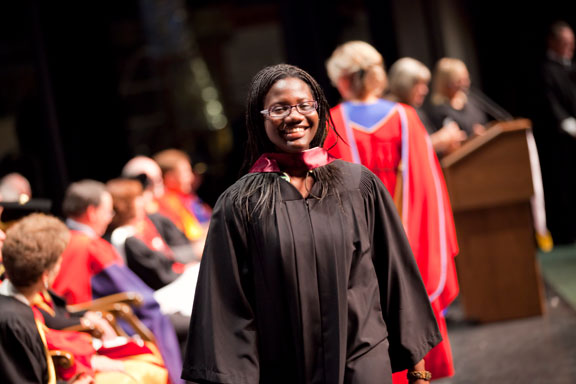Student advising: the path to academic success
Guided by the recommendations of a 2010 external review and with the concerted efforts of many people across campus, the U of S is closing in on its goal of providing students with the best academic advising possible.
By Colleen MacPherson "There's no group who understands the student experience better than advisors," said Dan Pennock, acting vice-provost of teaching and learning, the position leading the effort to reform and improve advising. "They know the barriers, the hurdles, the common issues that students face." By taking action to improve advising on a number of fronts, "we're hoping to greatly reduce a lot of the irritants that students, and even their parents, have faced."
"There's no group who understands the student experience better than advisors," said Dan Pennock, acting vice-provost of teaching and learning, the position leading the effort to reform and improve advising. "They know the barriers, the hurdles, the common issues that students face." By taking action to improve advising on a number of fronts, "we're hoping to greatly reduce a lot of the irritants that students, and even their parents, have faced."
That process began in 2010 with a review of the U of S undergraduate advising system by three consultants from the National Academic Advising Association. Based on their recommendations, the university established an advising council in 2011 that is currently working on an advising charter, said Gordon DesBrisay, associate dean of students in the College of Arts and Science and acting chair of the council. That charter will define "broad principles that apply to any advisor, a common set of expectations for advising in every department and college." The council is also "a body that gives voice to advisors so their experience can inform decision making at the university," added Pennock.
For students, perhaps the most visible advising change is DegreeWorks, a new degree-auditing program. Currently available to students in the Colleges of Agriculture and Bioresources, Engineering and Arts and Science which has 50 per cent of all U of S students and 70 per cent of all first-year students, DegreeWorks ensures that students, academic advisors and faculty are working with the same information to guide students toward their academic goal.
"DegreeWorks will take the fear factor out of advising," said DesBrisay. "It actually drives people to advisors, not away from them. And by having all the details right in front of you, you're able to have higher order conversations with students."
DesBrisay pointed out DegreeWorks is integrated with the university's student information system so a student's file shows exactly which classes they have taken, are taking and need to take to complete their program, meaning academic advising is very particular to each individual.
Plans are to have DegreeWorks available to students in the College of Graduate Studies and Research as well as all other professional colleges by fall, with more colleges to follow.
The work of the advising council also includes organizing professional development opportunities for advisors, which Pennock sees as an important step in enhancing professionalism. "My hope is that we develop PD for all advisors to ensure a more consistent experience for students across campus. In particular we have to work on timeliness and access. These are legitimate gripes that students have and addressing them is part of professionalism."
Pennock said the efforts to improve advising have been supported by about $1 million over two years from the Provost's Committee on Integrated Planning but discussion needs to take place about establishing stable, long-term funding. DesBrisay added he believes that investment will pay for itself in higher student retention numbers.
"All of the things we've highlighted are coming to fruition," he said. "DegreeWorks will really come into its own with the registration period this fall and now we need to start to measure things like retention rates. We want to see a statistical improvement … but advising has to be understood as part of our academic mission. Advising is teaching; this is a holistic enterprise, not a seasonal one tied only to registration and choosing classes."
Looking back over all the time and resources invested in advising, Pennock is optimistic improvements will continue to be made but one of the most important gains so far has to do with simply raising the profile of advising. "Advisors have felt undervalued and giving more recognition to the important role they have is in itself a great outcome."

